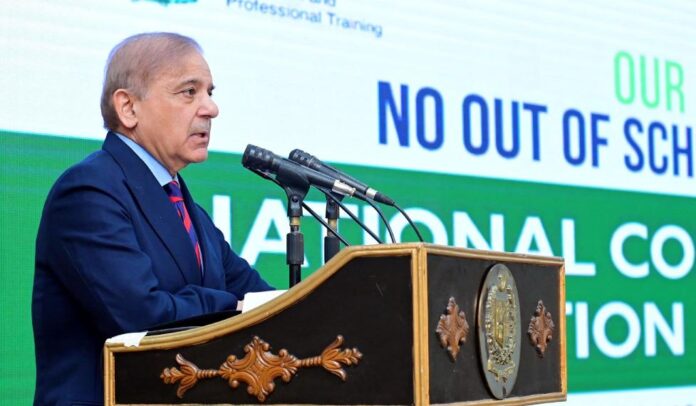Prime Minister Shehbaz Sharif on Wednesday declared an ‘Education Emergency’ across Pakistan to enrol around 26 million out-of-school children and promote literacy to make the country regain its lost space and develop it as one of the most educated societies in the world.”Today, with iron conviction, and the support of provinces, we will handle the challenge of 26 million out-of-school children. We will bring them back to school…I declare from this moment an Emergency in Education all over Pakistan…
The way we did it in Punjab, we will do it in Pakistan,” the prime minister said addressing the National Conference on Education Emergency. He told the gathering of federal ministers, parliamentarians, vice-chancellors, diplomats, and development partners that he would personally supervise the programme and meet all the chief ministers, setting aside political affiliations, with a vision to march in unison, expressing the hope that the provinces too would extend their support.”This is about our children and our future…
This is a very challenging task, no doubt. But nations which had faced difficulties and defeat in the past arose from the ashes of defeat. Germany and Japan are the examples. Why can’t Pakistan be? I guarantee, if we move in unison to find our space, Pakistan will emerge as one of the most educated societies one day,” he remarked. The prime minister, recounting the achievements of the Punjab Government during his chief ministership, highlighted the boosted enrollment rates, especially for girls, through initiatives like the Zevar Taleem Programme, and rescuing 90,000 boys from brick kilns to sending them to schools. He also mentioned outsourcing of 10,000 poorly performing schools to improve education quality and established Daanish Schools which offered free high-quality education and boarding for underprivileged children. The Punjab Education Endowment Fund provided scholarships to hundreds of thousands of deserving students based on merit. He said the enrollment of 26 million out-of-school children and stunted growth were major challenges facing Pakistan which required huge financial resources. “But the real challenge is the will to do,”
he commented and recalled Pakistan’s manifestation of the commitment to become a nuclear power despite international pressures, and eliminating terrorism by sacrificing around 80,000 lives to establish peace in the country as well as the globe. In his address, Minister for Federal Education and Professional Training Dr Khalid Maqbool Siddiqui said the education sector needed immediate actions and urgent responses as Pakistan stood at the crossroads of destination with no option to lose.”The statistics on education in Pakistan are disturbing, alarming and disheartening. More than 26 million children are out of school. This number is greater than the population of 150 countries in the world,” he commented. Unicef Representative in Pakistan Abdullah A.
Fadil said over 70% of children of age 10 in Pakistan could not read or understand text. Despite constitutional guarantees, education in Pakistan was neither yet compulsory nor free. He said through enhanced investment in education and young people, Pakistan could regain its lost stature as the first Nobel Laureate in Physics belonged to Pakistan and that the country also recently sent a space mission to the moon. British High Commissioner in Islamabad Jane Marriott said that Pakistan with 60% population under 30 years of age was at a crossroads to make tough choices. She said the conference called for urgent actions like enhanced funding, inclusivity, multiple shifts schools and retaining the children, and assured her country’s all-out cooperation to make Pakistan achieve the goal. World Food Programme Country Director Coco Ushiyama in her video message said food security and education went hand in hand and school meals were one of the best programmes to invest in the country’s future. World Bank Vice President Martin Raiser said Pakistan was faced with 40% of children having stunted growth and the ratio was around 60pc in poor districts.
He also commended the prime minister for taking the out-of-school children as a challenge and suggested the government hold absent teachers accountable, and provide public transport, safe roads, toilets and electricity in schools to enhance enrollment. He said as Pakistan’s education system was vulnerable to climate change, it was a must to invest in climate resilience. Pakistan’s fastest mountaineer Naila Kiani, in her video message from Makalu Mountain, said she had been able to achieve her dreams just because of self-belief and education. She requested the prime minister and chief ministers to allocate more resources for girls’ education to help them materialize their dreams.



